.picture of current MX Linux desktop... with VOYAGER 1 and/or 2 - I
made parts used in them... rather proud of that.
A new computing adventure based on where I was and what I knew
>> headed to the future and as little or none of anything
Microsoft... including the large language model...` settled in one
sentence; Microsoft anything is utterly destroying the world... end of
lecture. now I am going to study the Idea of a combinatinal LLM to
check for netrality of somepthing like that to see about feasability
(outside of a discusuion of Politics.... for obvious reasons.)
here I am using the most advanced form of computing I can... and
freedom and liberty is important... Western World Centric... only,
biased religions not needed. different subject
I am going to build a form of A.I. computer with pure 64 bit Linux
and AMD ryzen CPU's and CUDA and Nvidia graphics AMD Ryzen or EYPC
CPU's - NVIDIA GPU and CUDA
as I can do it... its more difficult today.
------------------------
I visualize the Universe in metaphors and with a strong spiritual
center... And like "big" Icon buttons.
I do not care if you do not - its my computer... do as you wish with
yours...
Below is more of a historical user POV of Linux - but I have an
observation, which is relevant to the state of computers (all
computing devices) in use today.
In the new world of both information overload and the fact that most
people only think of themselves as free (as in freedom, if in the
United States as it was)...
... It really is a case, as spoken by Benjamin Franklin, that those
who are willing to sacrifice essential freedom for small sense of
security, deserve neither.
That is the type of un-freedom I speak of here... not the political
kind, although that is a
factor, its the social type that leads the future of what
will be.
Not a conspiracy in this case but more of relinquishing to "authority"
- A big Mistake on the part of humans today
- A failure of the spirit of being, of human understanding, and
fighting the forces of oppression - omnipresent,
at all times and in all ways.
It is a fact that being free, more than most realize... is the
state of mind to be free... and that always takes work, responsibility
for ones actions and the effort to be aware.
And how is this relevant to computers? The global network which is
now, the collective mind of the world... and the more advanced
societies are coming to a state of incomprehensibility of both the
meaning of life and of society... both of which are, as yet, not
really cognoscente of how true that statement was.
An authentic observation of technology moving faster than social
awareness. This is the now of things as they are.
For many who live in the world do not realize they have the choice to
be either, sheep and be lead...
or to be truly aware and work towards being educated towards a goal of
self realization... of thought and of spirit.
...which cost nothing but the effort to be so.

And so... Technological freedom is a possible way to maintain a
type of freedom of how one thinks... What one uses to communicate in
the world as it is.
Offering a light pointed at how much control of your future is
possible... Free-will exists, a gift of the creator is to think... do
not relinquish that to political/religious/social-temporaries of
popular thoughts of managed limitations you are given by
"authorities".... ( NOTE: Lots of broken links below as I am
modifying the page... )
Life is what you do - you have a choice
individually to fight or give in. Accept the welfare state or demand
the idea of freedom of thought.
A way into the future. Linux
MX is tops as far as I am concerned, at the large list
of distributions at this time. Because for most people it is
easier than most distributions of Linux to use.
- 2019
- Notes: The links may go stale on
this page as I just can not dedicate the time to keep as current
as I would like to, but this page will remain up. The amount of
usable links on the page is extensive and for those who have an
interest in Linux (the worlds most useful Operating System) this
page is a wealth of info. With lots of pictures on this page, of
Linux desktop screen captures.
- Linux online
only web browser client devices, being pioneered with the Chrome-book.
which is not a laptop by design.
- Hardware
managed by Linux
embedded you use everyday, like your Automobile and your
Television.
- Supercomputing
the "big iron" of the modern world, Linux runs 98~99% of the worlds
supercomputers now. (100% now 2022)
- In "Cloud"
Computing, long ago it was known as Mainframe and Dumb terminals which is today
to simplistic to be relevant as a description, However it is
mostly beyond the scope of this page.
- Hundreds of
Linux variants as
Linux
Laptop computers. which are based on and forks from 4~5 major
family's of the one standard base of Linux.
- Desktop
computers like mine... the actual original goal of Linux. This is
the smallest use of the powerful operating system and GUI and even
so is likely 3~5+ Million Machines around the world.
Nobody is sure how many Computers there are as they are made
from either custom builds like mine, some purchased pre-installs from a
specialty company like Dell or uninstalls of preexisting computers with
MS Windows® originally and then re-installs with a Linux... but the guess is good
Why the smallest use?
"Welcome
to the real
world," By
the way, congratulations go to
Linus
Torvalds who won the Millennium
Technology Prize.
Having talked a little
with Linus (Linux-con 21?23
September 2009 - Portland)... he is very honest and blunt... for
very good reasons.
*** Note:
The principal drawback to using Linux
is now, as it always was - to much
complexity and no unified
user plan to deployment... thus, few pre-installs.
Which in its irony, is also its greatest user power. To choose how it
gets used and the total flexibility that a Linux has in its deployed
environment.
Frankly, this will never change... Unless a superpower company comes to
install some form of a Linux distribution across a platform, such as
Android has done. Gaining an 83%
market creation.
( the only compliment and/or derision - both at once for Microsoft's
products is the note that as total dictator of the office computer {the
desktop} they controlled the market at one time... now gone -
thankfully... but note this: That is also why the market was stable.
One narrow company, one way and thus a mono culture full of viruses,
Trojans, worms, ugly's that Linux is free from due to everything being
different.
That is it really - one system is pretty tough {( *impervious
- mostly
- Linux e-mail anti
virus ClamAV - be smart
protect a windows system
)} due to design on the web, variations, complexity and machine specific
compiling of the software (Linux) - And the mono culture of Microsoft,
full of well known flaws, (MS Windows) where one way = big fat target
rich environment of back-door's... (what do you think vulnerable
computers means)

First, this is not about the use of cloud services as such, in point of
fact I mention this because, I wish to maintain control of my own
creations and data.
We do not use the cloud in the main for this reason, however
and this is very important to realize, if you use the internet,
you are using the ultimate non-centralized server service already.
The exceptions due to the exact nature of the service, is 3D mapping of
the planet and dynamic real-time weather displayed in those specialized
applications such as Google-Earth and Chromium's 3D mapping both of
which is utterly dependent on the internet.

This page is more of some historical reference and a number of
pictures are more than a few years old...
which in the landscape that is Linux is automatically a Jurassic
time reference to the pace of changes ...
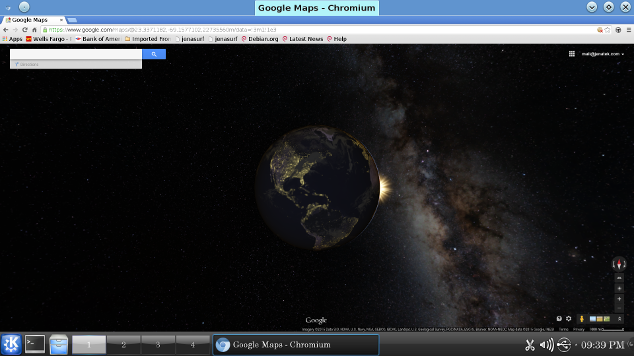
Correct spacial placement - synthetic 3D image of earth.
When you move the positional location, the Galaxy with our local group
(stars) sync to you new position correctly.
Frankly this is awesome.
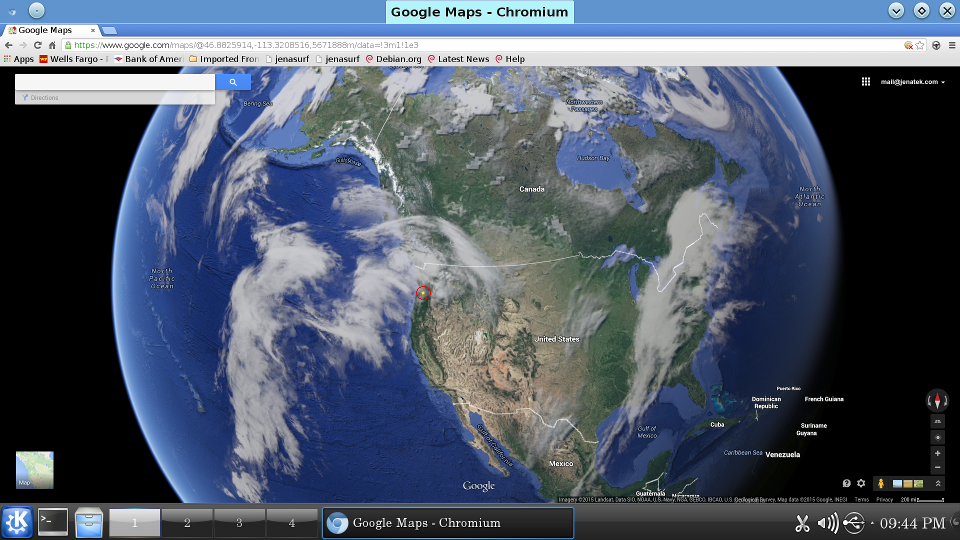 .
.
Time lag measured is in minutes - atmosphere with synthetically
rendered major weather that is usable and pretty accurate.
That little yellow dot under the cloud above left center is this
machines location... from space I can see the entire World... with a
fairly precise eye on global weather.
Think about that for just a second... How much power each of us has in
today's world...
I built this computer from nothingness into a machine that sees the real
world virtually - Linux was started by a student in Helsinki, Finland...
Who wanted a Unix like system to do personal computing on...
...now that evolved system runs almost all of the worlds massive
computer networks and super computers.. Google
is a Linux based entity...
These applications depend on a solid internet connection to even work.
So we in fact use a type of off-site server service without
date storage off site.
Linux in point of fact is a creation born of and on the internet, ours
even more so, as I mostly run a living Rolling Release which is always
"Up to date" for all of it applications and programs by a day or so. (
was so but not now )
I was trying to demonstrate on this page the rapid change over time
with the applications by having date stamp versions listed, but that
does not actually mean anything to most people including as a necessity
those who use Linux so in the interest of simplification and my
available time to make those notes, I am dispensing with the practice of
that..
Instead is the blanket statement that this page shows a handful of
useful applications that make my desktop Linux computer useful and
interesting to me and whatever date it is, this computer is very
current. The last two remnants of that practice is found in the two
pictures below. The top picture is from 2013 ( Galadriel from {Lord of
the Rings} ) and the next one down ( Enya ) is from 2015
...and the last one 2022 -( Aurora
Aksnes ) same computer...
-----------------
Today's date is Nov 12, 2016 and I use a KDE 4.14 based system and the
valid current Kernel of Linux to date so as I list some of the
applications they will have one last marker of the versions and that
will be it for a couple of years
Below; A sample aptosid Linux Desktop - in appearance it may look
simple. However, it is not a simple computer ( if ever any computer was
simple. )
The green writing is for your benefit, I don't list what the
applications do... Who does. No joke, someone asked me.
I created the backgrounds out of pictures and images I like and
sometimes create text to go with them...
Lots of people do this type of thing, I am no different, but I do
personalize it with some intensity...
for me the Personal Computer is an important extension of the
mind and I do add some aspect of a spiritual essence to it, no more or
less real than any other creation one lives in.
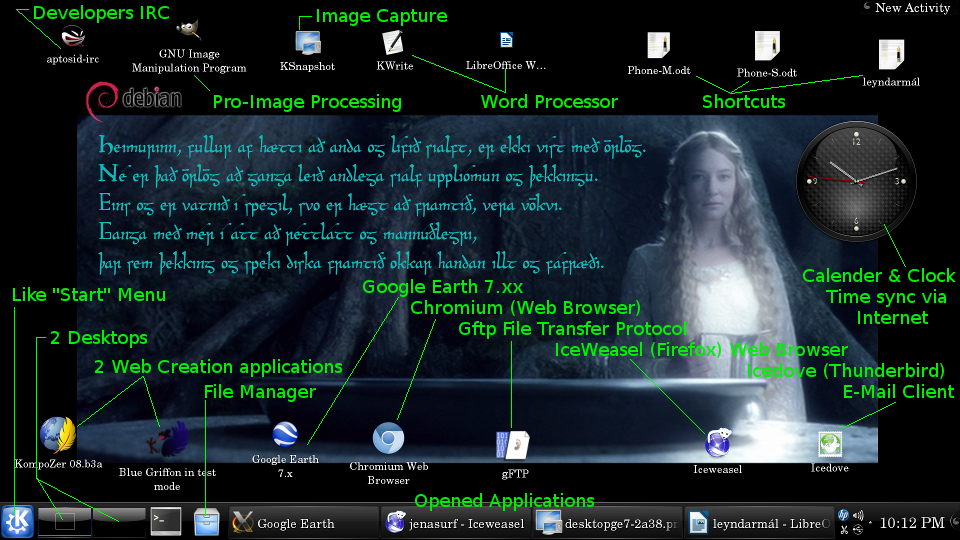 .
.
The Picture above:
My KDE
desktop Linux as example, Above in 2013 but outside of many
applications - much the same
below, January 2015:
Today's modern computer system, always up to date in the real sense as
it is a Rolling Release.
This picture is the now functionally extinct, Aptosid, which I still
have one alive...
See
Siduction
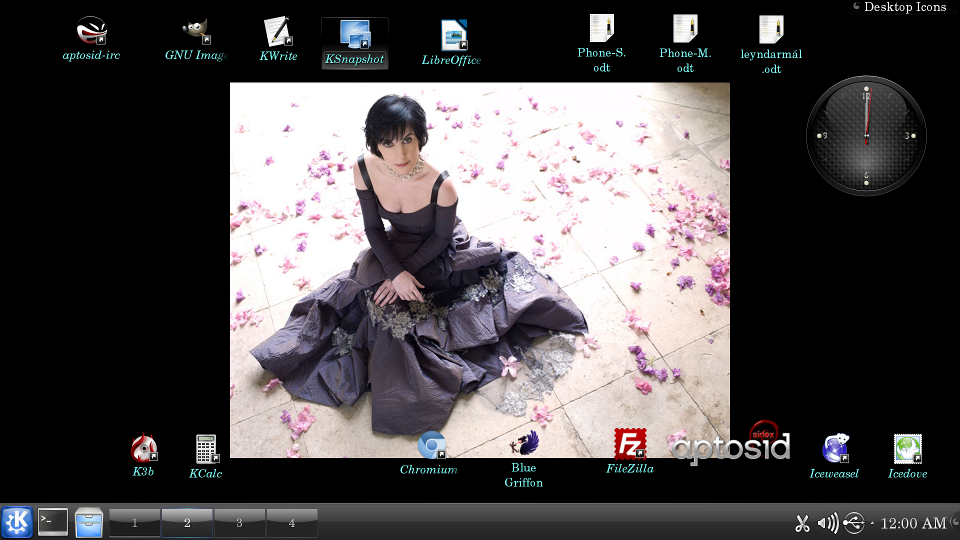 .
.
Picture of Enya, ©Warner
& co.
Jan 1 - 2015 first thing done - take the
picture. Font rendering in Linux is top notch now - has been for some
years.
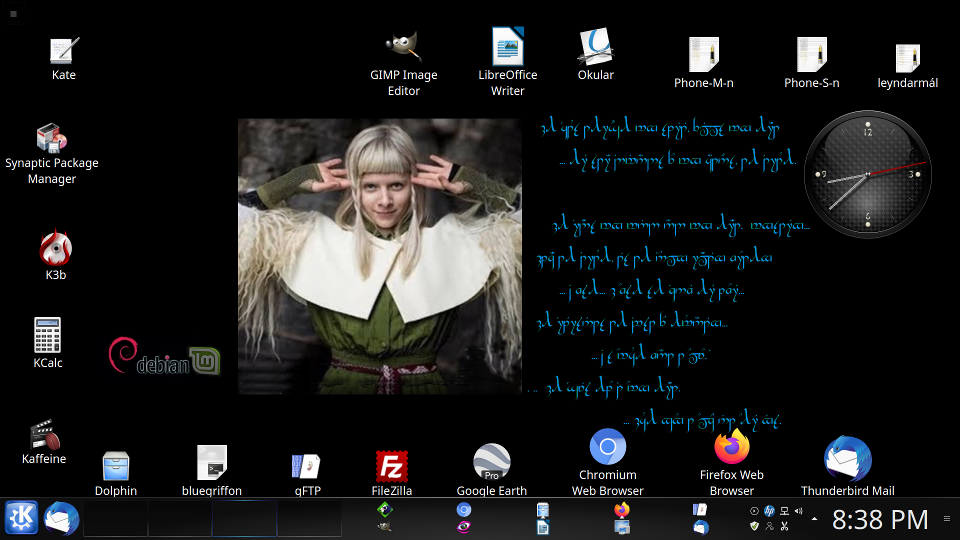 .
.
picture of ©Aurora Aksnes
KDE-07-28-22
desktop above... - current for me but is 9 years old, today... it is
Old,
current MX Linux - desktop in evaluation
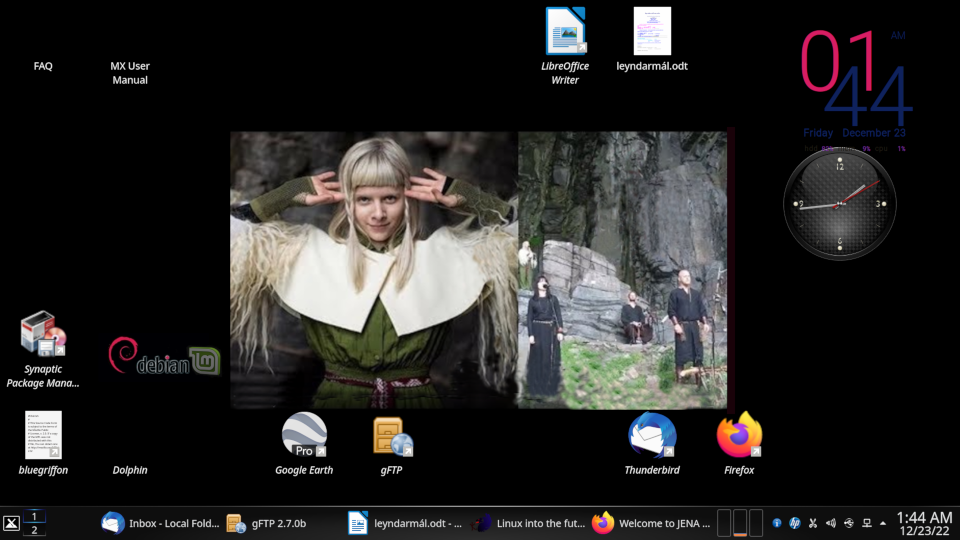 .
.
Picture of ©Aurora Aksnes and Wardruna©:
Wardruna, Aurora and Oslo Fagottkor in Kirkhelleren pĺ
Sanna, Trćna, Helgeland, Nordland, Norway
KDE version
Note: As KDE (desktop) is no longer really supported by Linux Mint
- I will be using a different version of Linux. Which one? - I, as
yet, do not know - but since I can do that, I will.
I liked Linux Mint ( even though its simple compared to aptosid -
aptosid became unstable in total {even though as a SID (S.till I.n
D.evelopment) version - it was born unstable} - that is what it was...
daily builds - I just got to old to chase it... life takes place
between the effort I put into being on the bleeding edge of the most
advanced system imaginable... that could be built.
however the botom line for me - I like KDE desktop more... yes it
requires massive power to run - so what - that is what this computer
is... its fast because that is how I made it.
Older stuff as legacy info - its a new world now so all of this below
is just a history of a journey into Linux...
gFTP replaced with FileZilla 3.9.0.5 ~( Note gFTP is now functional again
May 2015 vers. 2.0.19)~ ( but I started to use FileZilla and it works
well... Will I go back?
gFTP was fast and simple and I am using it again.
Kompozer 0.8.b3a replaced with Blue Griffon 1.7.2 - No going back to
Kompozer it died out, Official
4 desktop virtual environments ( Linux is and was multitasking from its
heritage, of why it was developed in the first place. )
( in the family of Unix Like systems )
Debian
unstable (SID) (current Linux Mint18.3 )
Some say it is a Bleeding
Edge system... So O.K. it is,
It is called aptosid
( apto~ "to make ready" and "sid"~ Still In Development, pre main
testing stage/ also in "Toy
Story" he was the kid who broke all of the toys in the film...
KDE versions in 2016 are in a large scale
upgrade path - so as of this date it does not have a version, as it is a
hybrid of KDE 4 (old reliable) and KDE 5 { bleeding edge :( }
I live on the computer a lot, KDE is powerful, Even luxurious and
beautiful if you know how to control it to taste.. and if you have the
power required to run it fast and its established as the best, in my
opinion.
KDE is, some would say "its old", yada yada...
did
you ever go to your favorite store and see some marketeer had moved
everything around just to mix it up...
I understand were all of its controls are and I know how to make it
pretty enough to like it. and its reliable.... That is why
Most people prefer... take your pick that is why... Linux rules
http://www.linux.com/learn/tutorials/783109-how-to-choose-the-best-linux-desktop-for-you

AS IT WAS: the history of this Linux build and my relationship with
the most powerful desktop system I can make from Scratch - like as hot
from the oven.
My computer is a
function first
build with an
emphasis on
productivity.
Global 3D
simulation
mapping, Graphics
and Image
manipulation,
internet and
e-mail power
applications (FTP
upload/http
creation with
powerful wysiwyg
web building
capability.
Multimedia video
editing and word
processing with
color printing...
That is a lot to
ask from a single
computer.
So it is an eight
core 64 bit CPU
from AMD using an
AMD64 based Linux
system that is way
out front of many
types of Linux in
my opinion.
This Linux
distribution
and my
modifications
to it is a
hybrid Linux
with many pure
high integrity
applications
that subscribe
to the goals
of Debian {(as
many as
possible) - The
Social
Contract}
2016,
Linux- (The
kernel) is
everywhere.
I started to
use Linux+KDE
desktop
computing
system before
Linux was a
successful
global
thing...
Linux today
is a given of
the landscape
of the modern
world, its
taken for
granted, it is
everywhere.
Most people do
not even know
they use it
everyday.
We use
Linux in its rarest
form, a
desktop
computer.
Surprising as
it seems to be
everywhere
except where
it belongs by
design the
most... Your
Desktop,
because it is
safe, powerful
and secure.
And now its so
EASY, with
many of the
simple and
easy types of
Linux out in
the world
now.... http://distrowatch.com/
Take your
pick, a flavor
for everyone
and anyone who
uses a
computer.
Its Ironic
really, Linus
wanted a
desktop
system, ...
the world
seems to want
everything to
replace the
"Windows®"
desktop and
Linux provided
that... yet,
It may well
not become
dominant in
the desktop
space.
Having said
that and In
consideration
that it was
thought some
years ago that
would mean
that
Microsoft's
offering as a
desktop
platform would
be the
dominant
system...
However, no
more, as the
"desktop" is
not what most
people use
anymore. It
is so varied
now, computing
devices
includes
everything...
Android
smart-phones,
i-phones and
podly
thingy's,
laptops,
desktops,
pads,
notebooks, and
other unnamed
devices one
might wear...
all referred
to now as
"Endpoint
devices"... in
that realm and
definition...
Microsoft®©
Windows®
controls 14%
of endpoint
devices,
that's it. A
declining 14%.
Mobile
has replace
the
traditional
desktop and
laptops may
become what
most people
used the
desktop for.
It
is not a
mystery why or
how as I will
explain on
this page but
for those who
know the
reality of
what Linux can
do, know that
Linux provides
a super
desktop.
84% of the
Global Market
is Android
(Linux) on a
smart-phone
device with a
screen and
camera and for
those who need
it, a Laptop
suffices as a
desktop.
The
traditional
desktop seemed
to go in two
user
directions.
One direction
is simple,
easy and all
decisions are
made for you
about the
installation...
like Linux
Mint, Ubuntu
(is Linux) ...
A number of
them are like
this, easy to
use and
install.
In the
case of Ubuntu
I think that
its parent
organization
would like us
to forget it
is version of
Debian
Linux... why
is a mystery.
We will just
not worry
about them,
they are off
on there own
journey.
Or... Linux
the powerful,
complete,
infinite and
often quite
complex... so
many choices
and paths that
it seems
to take a
genuine
computer
enthusiast to
make good
choices in
order to make
it easy and
comfortable to
use. Linus
Torvalds
father and
creator of
Linux says
this of Debian
(nobody can do
everything - I
would be lost
in developing
a bit of
kernel which
is his
specialty.
Slackware and
its variants
which declare
themselves to
be based on
Slackware,
Debian and its
variants which
declare
themselves to
be based on
Debian... Many
of these are
available.
I have not
used Fedora
based types of
Linux since it
was called
Redhat, I did
start there
many years ago
though. I left
because I
discovered
Debian before
Redhat became
Fedora for
users.
I just
never went
back to a
redhat-fedora
rpm based
system...
Nothing wrong
with it, I
just went to
the next
neighborhood
and liked the
style of the
homes, if you
know what I
mean.
We
mainly use a
Debian based
system called
aptosid
Linux, ( a
Rolling
Release.
Explanation
below on this
page )
And as
an interesting
system, a
version of
Debian Linux
called Tails+Tor
1.8.1
which is
somewhat
secretive when
in use because
it is designed
to be so. very
very secure as
a live system.
(Upfront
info for
interested
organizations,
Our interest
in Tails is as
a future,
potentially
needed, system
for its
security.
Currently
curiosity and
knowledge.
Wisdom, to
know which and
when.)
It has many
legitimate
uses but like
anything
really
powerful it
can be both
abused and
used for
nefarious dark
web stuff.
Walk a higher
road.
All will get
there, All are
productive,
some with
skill and
experience and
some by
default by
design.

The original Idea of
this page was to promote the use of Linux
on the desktop of a Personal Computer.
That still is true, but this is also a
reality check in a changing world... just a small part of a world that
is different than what was.
Not a judgement call as to whether or not it is better world or a lessor
one. However it is different. The computer and the users landscape is
different now.
The applications are different because the operating systems are
divided between the new world of mobile and the slightly declining one
of common desktops purchased in stores. (those are the desktops in
decline) Those who would build their own computers are still there.
Noteworthy, high performance gaming machines are slowly changing the
landscape to include Linux more but that is very much a new phenomenon.
Although that is completely out of the context of this page, it is
significant information. More
found here
The rise of powerful computers, if
one has an interest, today's workstations rival high performance
machines of a few years ago.
The machines themselves and Linux
have become very powerful... - Go to category and select Operating
System Family.
And for obvious reasons security from all sides is needed, more than
ever, now.... I have one of the more secure systems because of its
rolling release status with cutting edge kernel and pre-current
applications made stable, being Linux. Security updates every week as
they are discovered and released. And the system is in fact inherently
more secure by design.
The statement, Trust No One, is a sad statement of the world, but in
terms of computers... and absolutely with
your data and e-mails in the cloud,
if you are not paranoid, you should be.
See the Groklaw
situation.
If you are using a commercial Operating System i.e. Windows... You are
the target of those who see an easy mark, only with some diligence on
your part can you make your computing tougher to crack.
I had to learn to think like a network administrator, i.e.
paranoid, as a job requirement.
Now, I, as a human being, have nothing but hope and wish the world the
best, I am
a participant implementer of that hope.
But here, I am also practical, with all the tools/weapons at the
ready, so If I sound a little cynical... its a necessary cross check to
a trusting nature. I trust the developers of Linux because they are
always looking at each other... and
depending on each other to be the best and honest. Frankly that
is one of the reasons Linux is superior. It just is on the human side
of things, that simple.
On the technical side of things Linux is winning by shear superior
concepts and management... Although it runs counter to the commercial
interests that are now supporting
it with fervor and the realization that it is a better model
of development, that falls into the category of - OMG this works, from
their point of view! Those companies who resist are slipping into the
past, faster as time goes by.
In other words Proprietary Software development is inferior to the
open source model. If you make a software's security system that can
stand up in the open and just be unbreakable, it will have the edge
over one that needs to be kept in the dark for fear it has unknown
holes that nobody has found yet. Logical, is it not?

Note about the commercial application mentioned above at
the beginning:
As a driven need and
proof of functionality this page is also a working page, a
sandbox,for my new web editor, The commercial version of Blue Griffon version
1.8
It is a commercial product (it was purchased) on top of
the "Free application",
the Linux version of course. Commercial? yes, expect more
of that. It is a new world.
Blue Griffon is a WYSIWYG and HTML source type of
editor very similar to KompoZer 0.8b3a.
I like it. It
will replace KompoZer 0.8b3. which I was using long past its time.

This is a very simple modern Linux desktop (as set
up), not anywhere close to extreme, nothing to crow about.
No falling snow flakes or dancing Icons or exploding or
burning applications on closure... I can rotate the
Desktops for switching them.
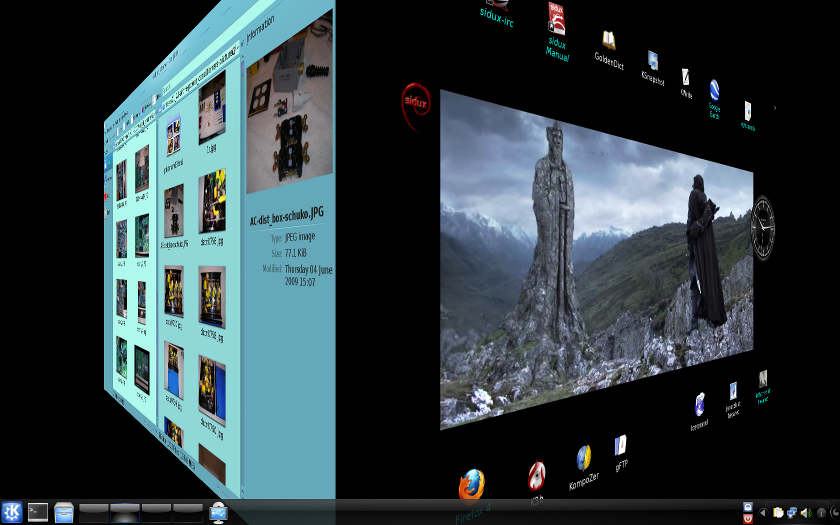 .
picture is about a year old.
.
picture is about a year old.
Maybe
someday I will
try some of
the
really pretty
bling... See
just below,
the you tube
video from Nixie
Pixel.
Above: This
system has
many desktops
as a potential
workspace, 4
of them as a
mater of fact
on this older
example....
caught in mid
switch. just a
plan cube,
nothing
fancy... see
the video from
you tube.
(the cube
better than
mine) http://www.youtube.com/watch?v=LGY9cwSjZsU&feature=channel Nixie
Pixel
I like the big icons and generally simple layout.
They are as I made them by settings available in KDE
(the GUI interface). I choose to make it look and be
as I desire.
My desktop wallpaper is something I created and
changes every few minutes. Behind the 4 running
applications which are the obviously opened ones are 190
running processes that creates the running computer at
this time.
It
is not a question of what can I do with this computer, not
anymore... It is a question of how I go about doing all of the
things I want to do with it. Big difference.
Unlike the common misconception that many people who use
Windows like it is still the only world... still have, believe
it or not, Linux is not a hobby any more... it once was, long
ago.
Unpaid hobby developers is a declining 11%, still a part
of a meritocracy... That means 89% are paid by corporations
(many big corporations) covering the expense to develop
"Linux"
Still in most ways it is a meritocracy because it is all part
of a gigantic peer review process, paid or not.
Linux is immensely powerful. True multi tasking
capabilities and it has been 64 bit for many years now... It
is not impossible to find 32 bit versions to be sure, but they
are now in the minority.
It is a matter of choice:
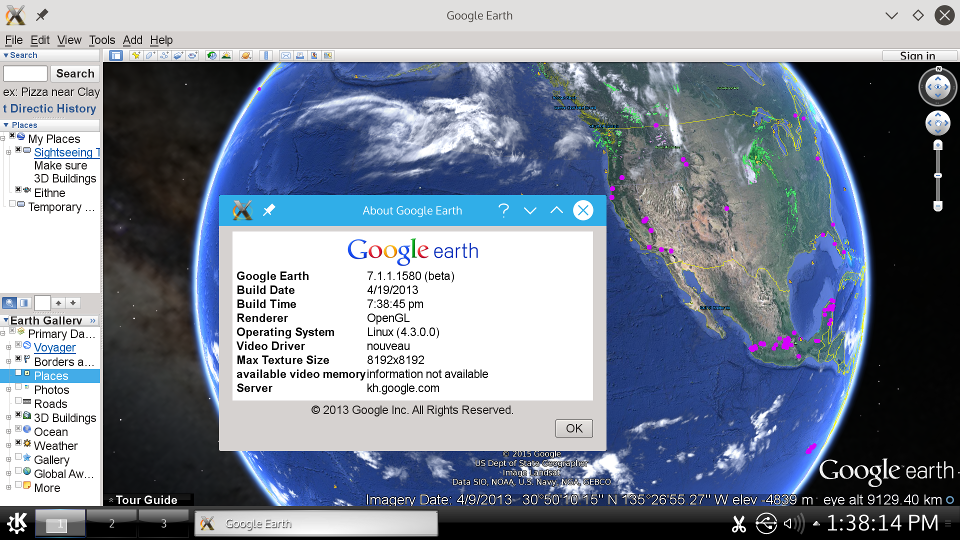 .
.
Google Earth 7.1.1.1580 beta running under Linux kernel
4.3.0-0.slh.1 (aptosid) yes, it can work. Nov. 2015
First what is this computer:
Lets find out what the Console (terminal) says it is... ( I know,
its just an excuse to mention the Console, it definitely exits to this
day as it always will in Linux )
This computer as of 11-04-15:
michael@Eyland0:~$
infobash -v3
Host/Kernel/OS "Eyland0" running Linux 4.3.0-0.slh.1-aptosid-amd64
x86_64 [ aptosid 2013-01 ????????? - kde-lite - (201305050307) ]
CPU Info 8x AMD FX-8120 Eight-Core 2048 KB cache flags( sse3
ht nx lm svm ) clocked at [ 1900.000 MHz ]
Videocard NVIDIA G86 [GeForce 8500 GT] X.Org 1.17.3 [
1920x1080@60.00hz ]
Network cards D-Link System Inc DGE-560T PCI Express Gigabit
Processes 198 | Uptime 5:18 | Memory 3984.5/7971.5MB | HDD WDC
WD6000HLHX-0,WDC WD6000HLHX-0,AS2105 Size 1520GB (13%used) | GLX
Renderer Gallium 0.4 on NV86 | GLX Version Yes | Client Shell |
Infobash v3.50
michael@Eyland0:~$
It is running on about 188 processes as a desktop computer when
I checked a minute ago.
Several minutes ago:
I just checked and it has 2,103 actual applications and programs to
actually get everything possible done that it may use already
installed.
sounds like a lot, doesn't it... well Debian Linux has in the
repositories available from around the world; 42,227
43,705 43,926
44,686 (1-7-15)
= 46096 (5-1-2017) about 80,000 applications, programs,
software available to use if I had a reason to need them. More information below with links
- fact is it is more but because of the limited repositories I am using,
this is the number.

.
today OCT 11 2015 The above is
version 0.81.4
This tool above... I use to check for
packages, it can install them... I
use apt-get as it is safer to use... but I do use synaptic for
what it is good for.
AptGet:
A fabulous Package manager system used in Debian and other great
distributions of LINUX called AptGet ....,
for well over two decades from
https://keivan.io/the-day-appget-died/
Bottom Line - Trust is
everything and it is earned, not dutifully driveled out because some
organization (Microsoft®©) THE #1 pretenders of trust, demand it...
Nithing-nil
Many
Computer architectures exist... only one is
X86 or its variations. By definition a PC is a
micro computer but does not need to be X86.
As a matter of fact, I am using an AMD64
architecture, on an AMD-64 bit platform. With an 8
Core AMD Processor, A true 64bit system.
The world is an ON-Line place, especially now.
Linux was designed on-line in a hostile world, made
to just take it as it comes... and now Linux is the
dominant system at large on this Earth. One way or
another, forked into many hundreds of versions for
every task under the sun, Android most obvious to
most... Linux is, the foreseeable future, period.
Linux or Unix is behind the heavy lifting of the
worlds data already.
Linux makes the Computer generated SPFX of the
movies you enjoy.
Linux
runs the Railroads and Air traffic control of the
world. Google is Linux at the core. All of
99.9999% of the worlds Supercomputers are Linux
based.
Linux is wrapped around
about a dozen or so
different types of
computer platforms
architectures that I know
of. And now IBM commits $1
billion towards Linux
ecosystem growth on
IBM's Power Systems line
of servers.

A few years from now there may be choices in
architecture even for a desktop computer... The
demise of Windows, as the only choice is ancient
history now... There has been a change in the
landscape for about 5 to 6 years. but now, this
year 2015 its pretty official, if not believed, as
there will never be a year of the Desktop Linux...
Global Linux perhaps, it is somewhat possible...
just not likely "the desktop" Those
desktops and workstations that remain are in my
view needing to be more powerful, to justify and
differentiate their existence in a light weight
mobile world.
That is OK, I like desktops and was heading
into workstation type performance anyway...
Mobile Computing is fine and is far better than
before, but I need and want power and speed.
It no different than any application of
technology and machines. Both cost, how fast do
you want to go and what can you afford.
As an individual, under no circumstances would
I trust any remote S.a.a.s., (software as a
service, in a cloud). forget it, for document
creation... We do use services in a
passive mode, search and Google Earth... for
example and Google Earth requires a client
system installation as an application, I am
just not uploading my stuff into it, that's
the difference.
note: as a company, it is something to
consider and be aware of... It is a cost
savings in some circumstances... but you
still don't own anything unless you own the
cloud.
Reason? Once you use a service, to create
anything... you no longer have control of it,
you do not own it, no rights literally by lack
of possession.
Its the same if you use a proprietary software
like Microsoft Office... you don't own your
own works (read the EULA) It was an issue at
one time, before Open document foundation and
LibreOffice, over which version of software
you could use to read your own documents...
Before the advent of Open Office and LibreOffice
which were absolutely not Microsoft
products... you had little choice.
E-mail... Personally, I feel it is the same...
I have to use a server as does everybody but
at least I am in possession of it. This is
the #1 reason Governments are dropping MS
office at the governmental level
{Lets use an example... lets say that some
legal document, like the "Bill of Rights" (you
remember that don't you?) was produced and
saved in MS word .doc 95 and it becomes
unreadable with MS Word 2000. And the .doc
is literally owned by Microsoft. Its kind of
extreme but it underscores the point.
We supported the document compliant
international standard ISO/IEC 26300:2006
(We - JENA Technologies, were members of the ODF
Alliance when it existed... and the ODF Alliance
had to fight to exist because Microsoft was at
war with the idea before it became
the law. (are
you surprised?)
What was Microsoft afraid of:
This: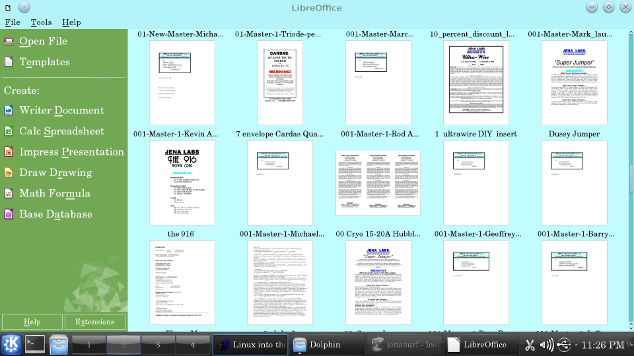 .
Screenshots
here
.
Screenshots
here
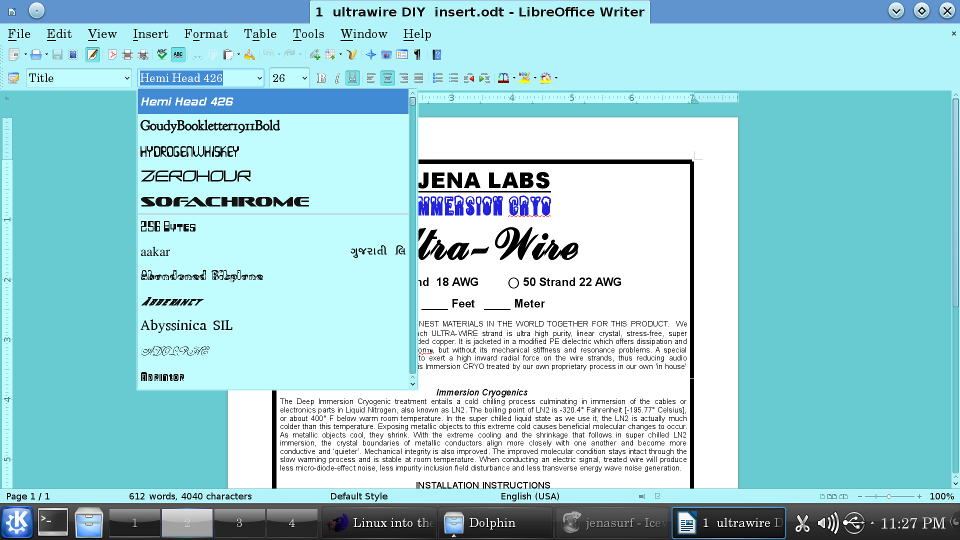 .
.
A capable
word processor that is literally free.
Linux is freedom, not
always free or freeware. If you do not
have money, then the price is learning and
education which can offset money to some degree
with most open source code software.
However the hardware is just what it is and
can be costly... What I am seeing and it is
understandable, is that some better applications
for specialty needs now are becoming commercial
in nature.
As Linux is moving the greater world now...
it is inevitable. If on the other hand
applications are mass market driven like a
really good word processor, LibreOffice
is a good example... they are supported by many
companies for the greater good, displacing an
entrenched proprietary and perpetually changing
one that can not be depended on to be a long
term standard. .odf is free to use... because
they will define the world standards.
However, For most people, the use of Linux on
the desktop will always be a future metaphor of
use... or may never occur, because most people are
going into the use of mobile devices... and in
that realm, Android flat out won..
Android
*IS* the Linux Kernel with modifications, all of
the rest is the User Space Interface
specifically designed for Android.
-
(Android is
very young, in
a way it is a
mess of semi
proprietary
software that
is not very
mature in a
practical
sense due to
its newness
and rapid
changes, its
users are also
migration
users within
mobile
computing. Its
growth rate is
so fast...
that, as
reality, is
likely not
going to
change much in
the near
future...
Android is a
boom town, in
fact All of
mobile is like
that.)
For the time being since it is not specific to
the "Linux Desktop" relating to performance
computing, "Android" will not be covered here,
just mentioned from time to time, I mention it
mostly because it is defensibility a Linux variant
in the big picture, That seems to be mostly a
worry to those company's who use something else in
their mobile phone offerings, but not so much a
concern to the users of an android device, who
for the most part are oblivious to what it runs
on...
This does not mean a "lets watch the big ship
desktop computing sink into the past" situation
though because if you need to use complex
applications like a word processor or do image
manipulation or want comprehensive control of web
based applications and build websites... or even
printing with control... the Desktop Computer as workstation
IS how it is done.
This is how we do it today... Android
Computers on something other than X86 PC will be
someone's future to be sure... but for now we will
stick with the pure Linux desktop computers.
That is and will be with or without the X86 PC.
You see it is the Personal Computer (PC) that may
fade in time... Not Linux itself.
To be sure it will not happen soon but it may
happen.
And it is feasible that in the future... a desktop
Linux could well be defined as a power computer
platform. .
That is
how I see it now...
Screenshot of application choices on this machine from just the
selection of internet applications in it currently:
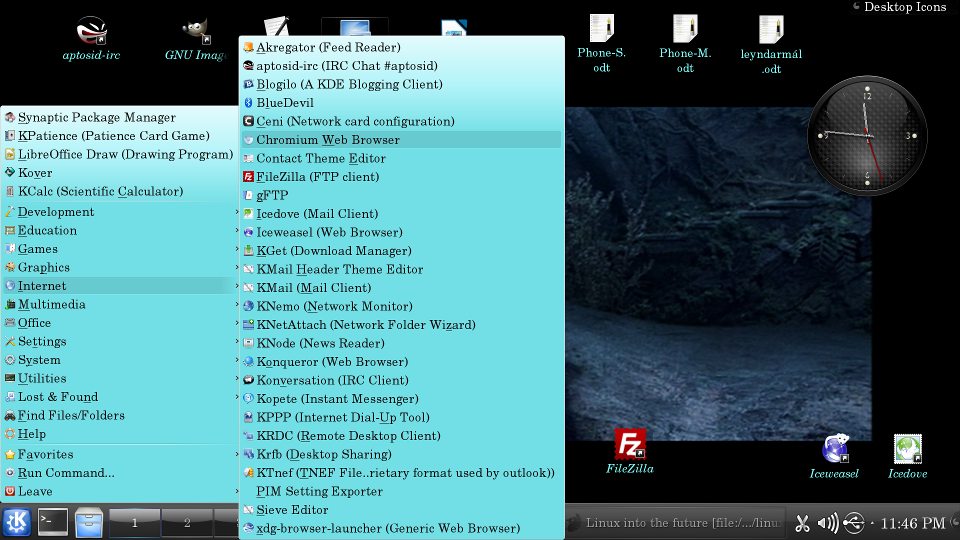 .
.
These are just the internet apps.
Hundreds of applications are currently in it.
desktop tonight, 1-2-15
It is very powerful.

* There
are many
hundreds of
"distros" of
straight-up
Linux.
Why is both
simple and
complex. Let
me show you
why... Too
many types of
Linux to ever
become like
the
dictatorial
One Way of
Windows® It is
never going to
become
universal as
to manor of
build or the
system of
compiling the
software
because there
is no central
agency
controlling
it. Want
proof... Try
to take this
in. http://upload.wikimedia.org/wikipedia/commons/9/9a/Gldt1009.svg
Note: That
last link, on
that chart
showing all of
the types of
Linux, each
one will link
to the web
site that
represents the
distro... All
of them...
What does
this mean is
the simple
part, There
will never be
a single
Distribution
of Linux...
The proverbial
one ring to
rule them
all. Simple,
it won't
happen.
Linux
was created
basically on
the internet
and lives on
it, and runs
with it. In a
manor of
speaking,
Linux is
becoming the
backbone of
the world at
the non
desktop level.

About my
aptosid Linux,
I had to build
it from
nothingness,
which I do on
a constant
basis, because
I can.:
Application
Web Editor:
Blue griffon
evolution of
web tools:
The
web editor as
a sample
history of an
application in
Linux
A fast
history:
First... I use
an HTML editor
from IBM for
Linux (since
1998 WebSphere)
until it dies
in 2004 then I
use Nvu
, it forks in
2005, I
followed and
used KompoZer
from then into
2013 around
October 20th.
I finally shut
it down and
migrate
entirely to
Blue Griffon.
KompoZer died
a slow death
and a long
attempt to
keep it alive
from me and
many others...
I was doing
things with it
like spell
checking that
passed on long
ago for most
who used it...
(I am clever)
but time has
come to lay it
to rest and
use its living
application
relative - as
it has proven
itself
worthy.
Its new again
in 2017 Blue
Griffon
For
what it is
worth... Blue
Griffon it is
a semi
commercial
product... This
page is now
being edited
with
BlueGriffon.
It is worth
the money... A
commercial
Linux product
that is
available is
very rare,
about $89.00
Which sounds
very
inexpensive
and it is in
actuality....
It is
revolutionary.
website http://bluegriffon.org/
Like I said I
use a hybrid
Linux with
sometimes not
native
applications
when I need
to.
The file
was not amd64
nor was it
aptosid... or
even base
Debian. It
is an x86_64
-- ( blue
griffon-2.3.1
-installed in
Linux Mint
18.1 ) and
designed for
an Ubuntu
based Debian
system
However it
works flawlessly

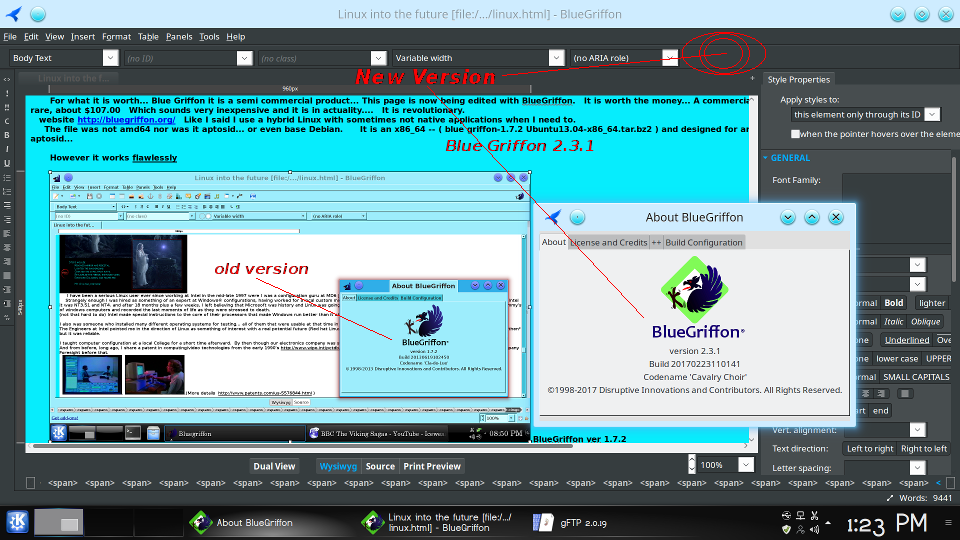 Above:BlueGriffon
ver 2.3.1
Above:BlueGriffon
ver 2.3.1
BlueGriffon
web editor
WYSIWYG and
source
capable. (By
the way it has
a built in
spell
checker... I
am happy with
it.)
Such is life
with Linux on
the frontier.
Application,
Google Earth
7:
Linux does
multi tasking
very well.
Multi
applications
working in
parallel is
never an issue
with the
Linux. It
always was a
multi-task in
parallel
system. Also
my Linux
computer will
run Google
Earth 7 as a
separate
application
build on the
same machine,
a good example
of a
collaborative
software being
used between a
computer and a
server out in
cyberspace.
I run it at my
local Machine
but it lives
on the web. It
is not trivial
to build on a
64bit
system... In
fact a lot of
people are
never
successful in
making it work
in 64bit
without IA32.
It will take
"alien" and
LSB core and a
lot of other
stuff... the
key word here
is
compromise.
Kind of a
metaphor to
life.Make
no mistake
this is a very
hard
application to
get to run
right in
Debian-aptosid,
only by
bending a lot
of software
can I get it
to run well.
It is not easy
to get to run,
but is really
powerful when
it does.
But it does
run.
GoogleEarth
7.0 with 3D
synthesis.
Reliability -
iffy - It has
a reputation
of not working
in a Debian
Linux, When it
does (when all
of the planets
and stares
line up) it
works well.
Note: image
Date
06-23-2013 :
|
Google
Earth
|
7.1.1.1580
(beta)
|
|
Build
Date
|
4/19/2013
|
|
Build
Time
|
7:38:45
pm
|
|
Renderer
|
OpenGL
|
|
Operating
System
|
Linux
(3.9.0.2)
|
|
Video
Driver
|
nouveau
|
|
Max
Texture Size
|
8192x8192
|
|
available
video memory
|
information
not available
|
|
Server
|
kh.google.com
|
.
.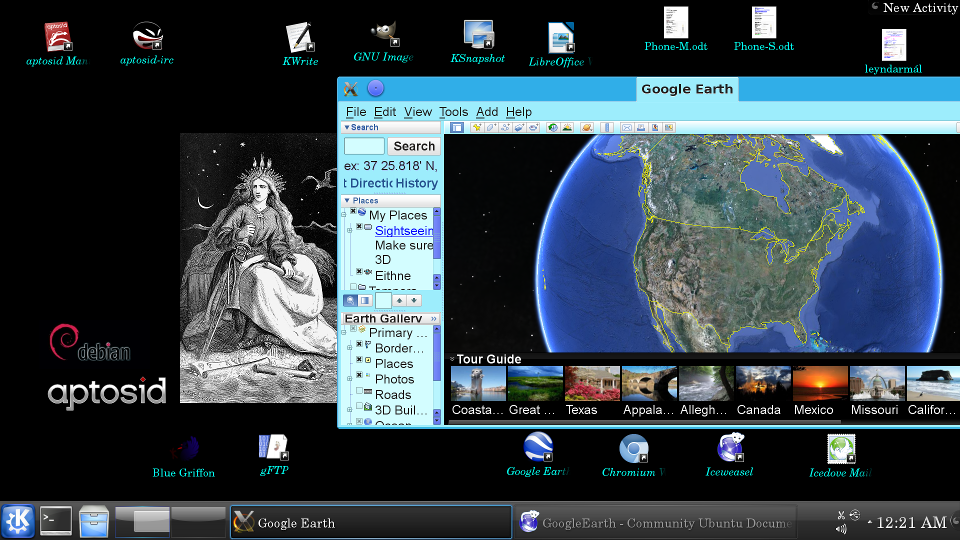 .
.
.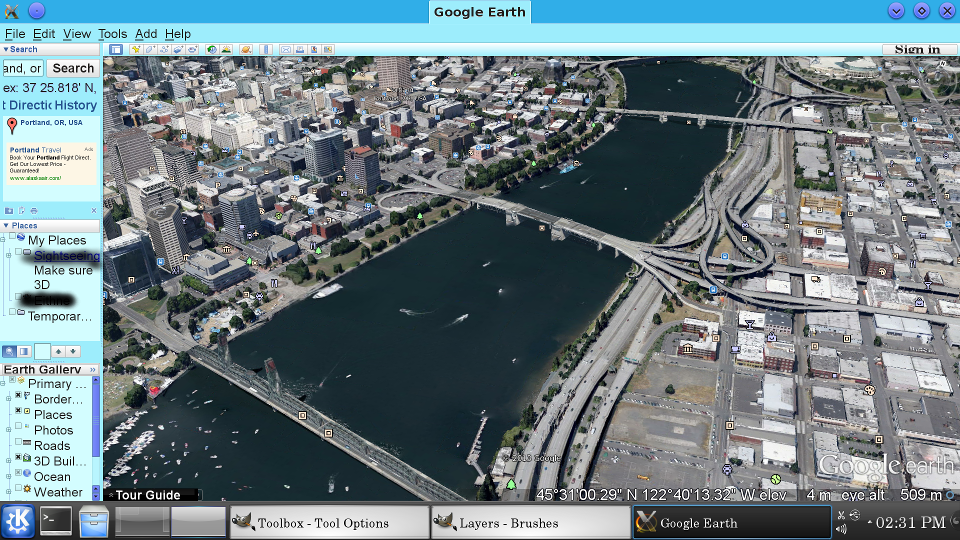 .
.
Portland,
OR. in
simulated 3D
is dynamic as
one "flying"
over it. The
whole world is
there to look
at and study.
From the
smallest
little island
to some of the
more hidden
places on
Earth.
This is not a
picture, it is
synthesized
from pure
data...
Awesome
technology. It
is most useful
as a map and
satellite
program for
exploration of
the earth and
moon, and to
some degree
the planets we
know something
about, by
flyover
missions.
However, the
synthesizing
portion of it
is in its
infancy now
and some day
soon is likely
to go beyond
just awesome
to down right
scary... if
you know what
I mean.
It is the
future of
things to
come. Like it
or not, the
future is now.
What we do
with it, is up
to us. Great
capabilities
demands great
responsibility.
The Image
below is
synthesized
from data, it
is not real,
its 3D aspects
and generation
is just from
satellite data
from pictures
and then
generated into
a 3D set of
images that
can be looked
at from any
angle and
direction.
At this time
it is not very
good but
considering it
is at all, is
awesome...
give it a few
years. This is
G.E. 7.0
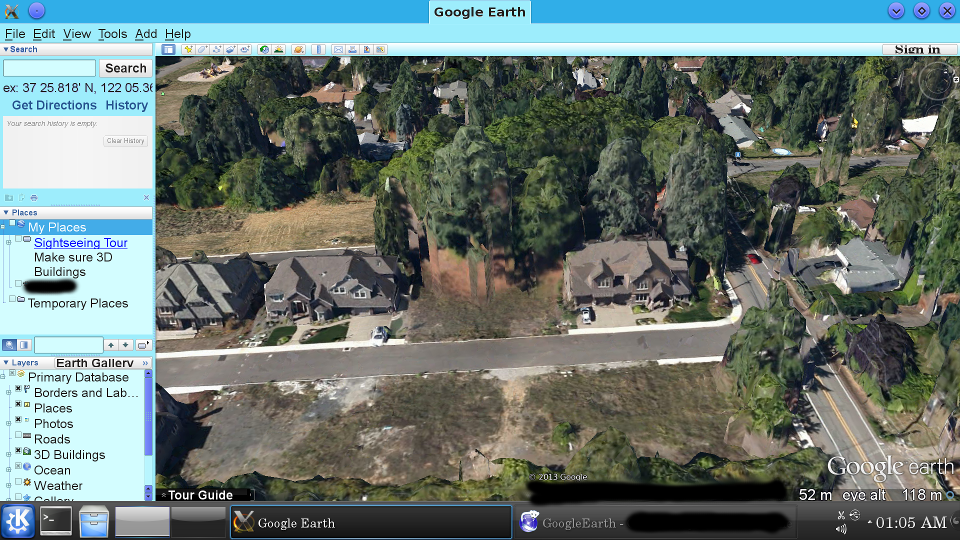
How accurate
is it...
Google Earth
that is.
below: Older
picture, about
two years ago.
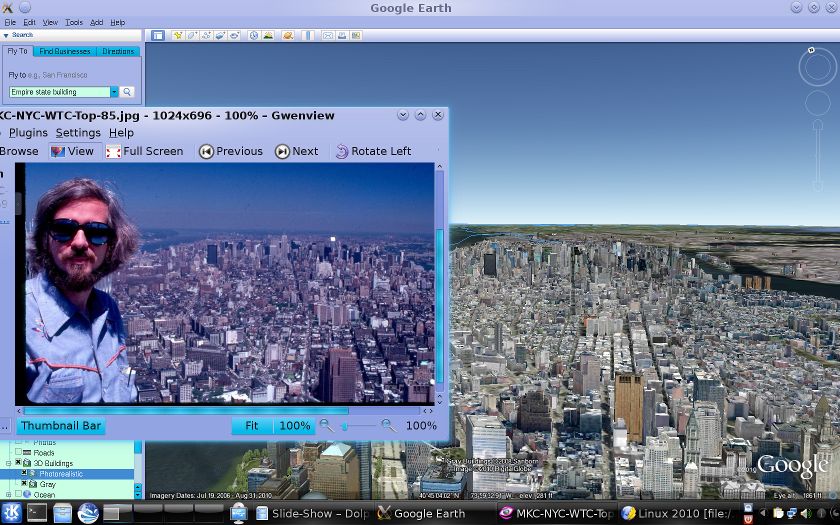 .
.
The above was
made with the
previous
version G.E.
5.0 - not bad,
one is a
picture from
the top of the
WTC (1985)
with
Ektachrome and
the other is
Google Earth 7
years ago.
Application:
Chromium
browser,
mapping
program
9-10-13
New image-old
program which
is far better,
superior than
the "new
Google maps".
Just because
you can, does
not mean you
should...
A great
example of
fixing
something that
was not broke,
I had to
remove the new
and
reinstating
the old.
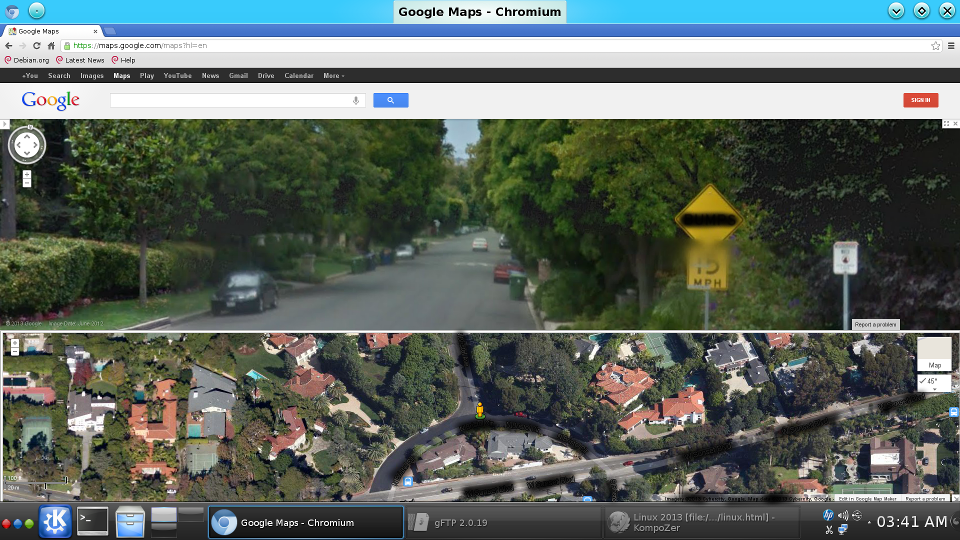 .
.
I just picked
a random
street in LA
somewhere, for
this picture,
the mapping
program is
extremely
powerful... so
something
rather plane
and simple is
shown.
Not too close
or intrusive.
It is capable
of being very
intrusive,
but self
discretion is
still very
important with
me anyway as
far a what I
would show
here.
Just so you
know, "This"
is the "New"
Google maps in
Chromium Version
35.0.1916.153
Debian
jessie/sid
(274914)
Its kind of
rough as a
work of
software, so
far. but keep
in mind it
will get
better and its
synthesis of
the image is
likely going
to be the new
way.
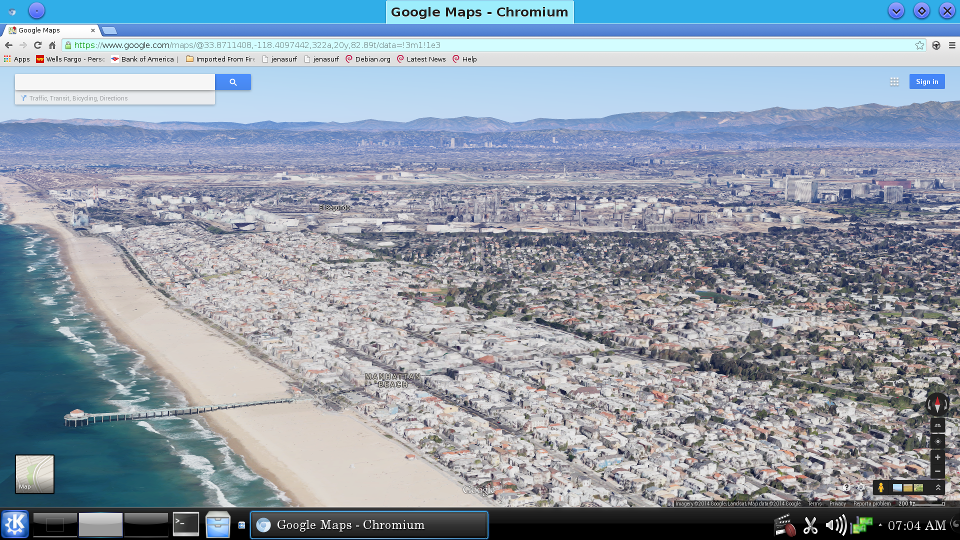 .
.
Obviously this
is a long
shot, however
it is very
capable of
getting in
very close
with a
synthesized 3D
image.
I miss the
split screen
which this can
not do. -
Currently
10-12-14
change the
setting and it
will do Split
Screen.
as it was
However it is
very CPU
extensive as
it is
simulated 3D
and street
view combined.
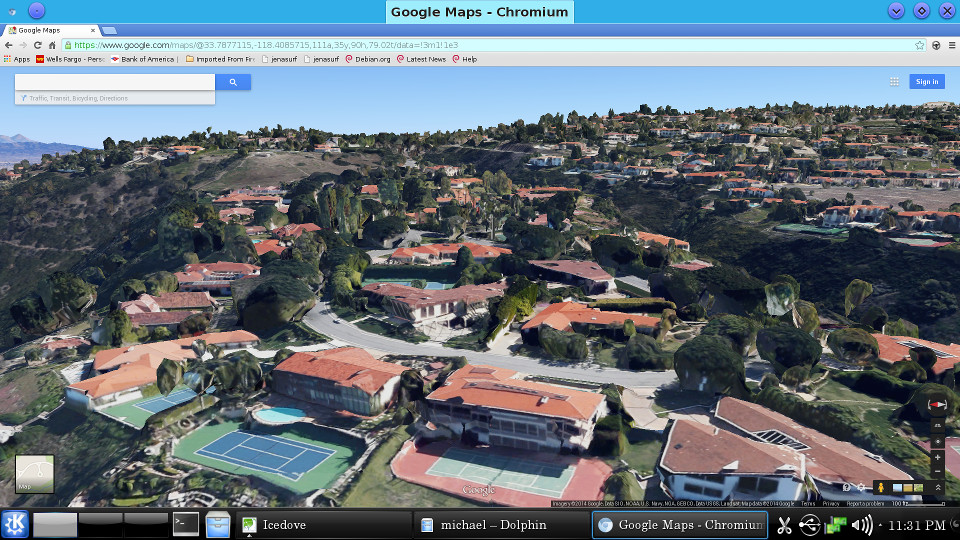 .
.
Just a place
near Los
Angeles
Application: Firefox
/or Iceweasel
in Debian -
running
youtube.com
version
38... Current
version is 38.3.0
-- 19-May-2015
12th
March 2016 is
version 45 -
Linux Mint
17.3
noia skins no
longer can
keep up ( and
they gave up )
so Firefox
becomes stock
and drab and
boring.
it is
rather drab
compared to
this "older
Noia" version
below...
. 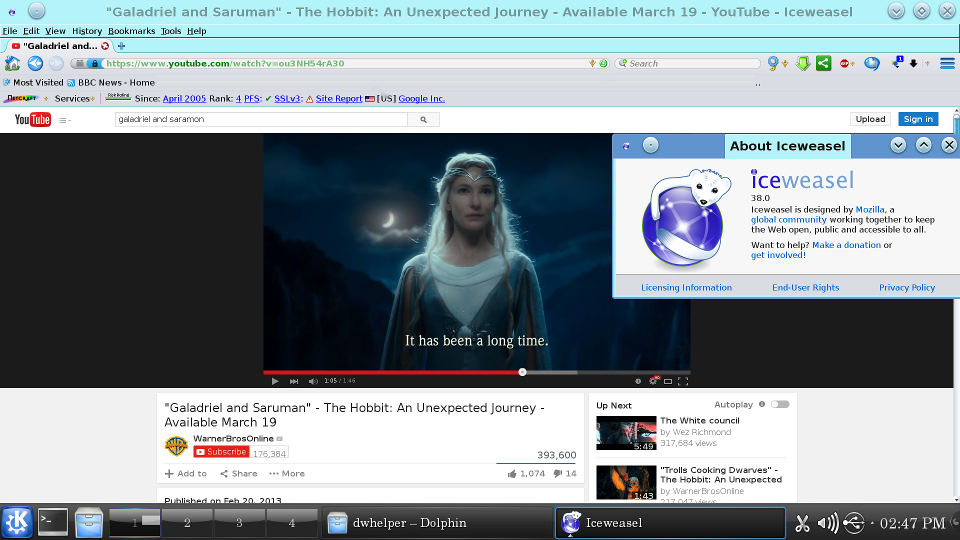
You-tube on
the www and
today-
Rather dull
but far more
powerful and
acceptable
trade off.

About Linux,
not just the
kernel
(specifically
that is what
Linux is, the
Kernel )
However, that
is not what
people think
when the refer
to it... the
entire
immense
project in its
entirety
mostly made up
of open source
software. by
design and
necessity of
perfected
growth, a
meritocracy...
is what is
generally
though of as
Linux
The benefit to
humanity is
beginning to
be seen in
Mobile as
Android
and Chromebook,
Also large
scale Linux as
applied to Supercomputers,
Defense,
NASA
and Yes in Intelligence
.
Open Source
Software such
as Apache
powers
a very
large part of
the internet
itself and
the majority
of the rest is
some other
open source
model.
Curiously The
one company
with a closed
source model
is only in a
commanding
position in
one place...
China Food
for thought.
Knowledge
is power,
truth (wisdom)
clears the fog
of ignorance
or
misinformation.
Linux will not
be stopped.
Fact is Linux
is of
Strategic
importance to
the US and the
rest of the
world now.
So Say the DoD
and DoJ as
well many
other
countries
http://www.justice.gov/opa/pr/2011/April/11-at-491.html
This
is
important
information
that indicates
how the world
is changing.
It use to be
that the
kernel of
Linux was
about 80-90%
individual
private hobby
code
contributions....
That was a
long time
ago... Now in
the year 2013
it is the
other way
around, 89% of
the kernel is
big gun
corporations
and powerful
companies
paying for it
to be the
heavy 800lb
Gorilla in the
room and 11%
private code
contributions.
This
is how it will
be, Linux runs
the world
now... going
into the past
is Unix and
that other
Operating
System that
breaks when a
rock is thrown
though it, so
to speak,
because mobile
waits for no
one.
Linux is a
right now
thing if you
want it to be
so...
aptosid
-(lowercase is
correct) Linux
is the
opposite of
Enterprise
grade Linux.
(so stable it
is dead) that
is what
Enterprise
means. Super
Reliable but
dead as a
doornail.
Look, many
people need
that. That is
why it is that
way, it is bug
free because
it is locked
into itself
and nobody
touches the
code, ipso
facto OLD but
very very
reliable.
Here is an
example of a Enterprise
Grade Linux
So in the
opposite
direction of
enterprise
Linux is
something like
aptosid...
What is a
rolling
release?
Short
answer...
Instead of
testing or
release
"versions" the
distribution,
it is built to
a live CD or
DVD that you
make... more
like the
entrance to a
freeway. Once
your system is
running on
your Hard
Disk, it gets
updated
whenever you
wish to go
through the
process of
updating it,
from the
network, with
as many of the
applications
and programs
you are
running in
total.
different days
different
programs and
applications
as they occur
in the real
world right
now.
Both ways
of running a
Linux are
valid and
serve
different
needs or
desires. and
these are the
extremes of
the world in
desktop
computers.
Time to
explain the
number of
Linux
distributions...
and why this
makes Linux so
powerful and
in the viral
sense
essentially
indefeasible.
Its all tied
together at
the core and
that is just
about all that
is tied
together... http://linuxmafia.com/faq/Licensing_and_Law/forking.html
But wait...
you think
Linux XYZ is a
fork of
something
called Linux
ZYX or
something
implying a
mess of
unrelated
Linux's
cluttering up
the universe.
> 400 plus
distros and
counting...
well these are
versions of..
or specialized
variations of
ONE Linux
Standard Base.
To
this day (yes)
not
one virus or
malware has
survived in
the wild with
any Linux as a
social event.
Period, not
one. I could
go on and on
about it but
what would the
point be.
security is
very much in
the minds of
those who code
for Linux and
it is always
in the
forefront of
seriousness
but there is
also the
aforementioned
inherent fact
of its
reality.
Linux is very
secure
even as a
desktop user,
more so
because my
desktop Linux
makes a
statement,
even slightly
with what is
possible.

Application
- File Manager
file manager
picture date
08-10-14
KDE
Dolphin
Version 4.13.3
Currently
using KDE
Platform
4.14.4
- Sept 13-14
change happens
fast
screenshot
below.
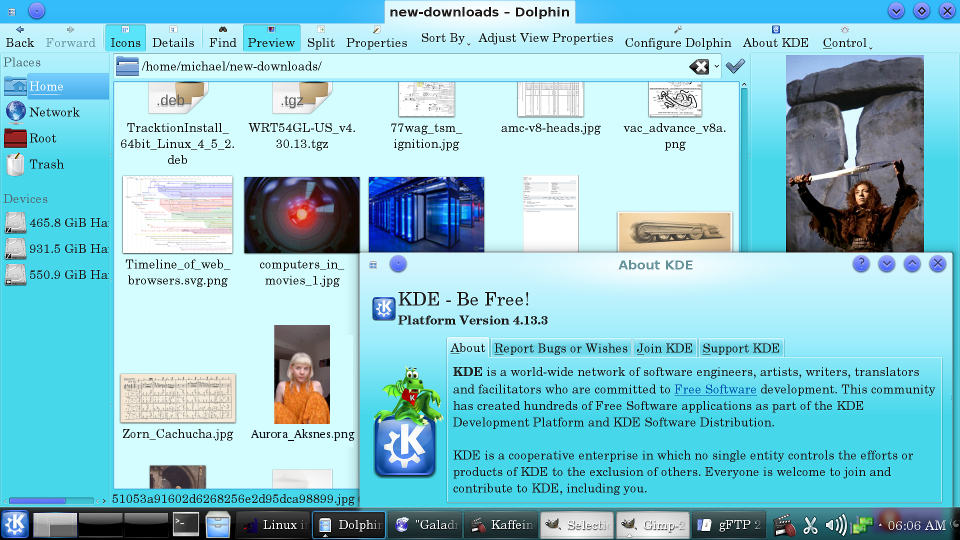
One
of
the really
nice things
about the file
manager
(Dolphin) in
KDE Plasma,
Linux, is it
can split the
file windows
by drives or
directories.
above is an
example,
straightforward
and clean.
Even though I
am running a
heavy and full
desktop
computer...
its real fast,
It is also a
heavy hardware
intensive
machine to
compensate.
Speed costs...
how fast do
you want to
go. I am not
scraping
pennies to
make this
possible. I
throw dollars
at it.
A store bought
computer like
this could
cost several
thousand
dollars and
that does not
include the
software. I
donate $ to
the
organizations
online for the
software.
It is not
exactly
forced... But
I am not a
"freetard"
Its less than
MS Windows®
and my machine
can do
more... but
the offset is
I have to
understand how
to build, and
use the
software.
Nothing is
costless, it
all has some
kind of
price.
Knowledge or
money or both,
usually both.
A good distro
of Linux will
have many good
applications...
aptosid based
on Debian will
have about
40,000...
programs and
applications
that provide
all of the
things one
might want a
computer to
do.
Currently my
computer has
1,756
applications
and programs
installed to
make it rock.
40,844
-- think I am
joking... I am
not... http://packages.debian.org/unstable/allpackages?format=txt.gz
The trick is
to know what
you need and
what you do
not need.

Removed info
on updating an
aptosid
Linux...
dormant system
now in 2016

aptosid
user/member #
is 97 ( Not a
power number
or anything
other than I
was there when
sidux changed
to aptosid and
logged in
early and
re-registered
as one of the
members of the
forum, I don't
post much. )
should I be
insane :) and
try to stay
with it as a
old dude?
aptosid forked
to become siduction
Is
my avatar of
challenging
fate, so to
speak -
guiding me to
try -
2019 edit note: I went to the siduction
site and saw my old log-on name was there and the identity was setup to
last forever... that is seductive
my avatar
 .
This,
is my avatar
was made from
a frame of
film "
Lord
of the Rings"
using the
GIMP
as it appears
at left, it
was never in
any film it
just looks
like it might
have.
.
This,
is my avatar
was made from
a frame of
film "
Lord
of the Rings"
using the
GIMP
as it appears
at left, it
was never in
any film it
just looks
like it might
have.
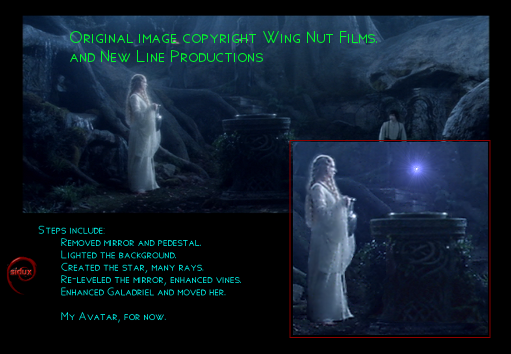
I have
been a serious
Linux user
ever since
working at
Intel in the
mid-late 1997
were I was a
configuration
guru at MD6
Jones farm,
Hillsboro, OR.
Strangely
enough I was
hired as
something of
an expert at
Windows®
configurations,
having worked
for a local
custom
microcomputer
configuration
company for
several years
Win95 then
Win98 at Intel
it was NT3.51
and NT4. and
after 18
months plus a
few weeks, I
left believing
that Microsoft
was history
and Linux was
going to
master the
world. I
still think
that is
inevitable. We
made crash
test dummy's
of windows
computers and
recorded the
last moments
of life as
they were
stressed to
death.
(not that hard
to do) Intel
made special
instructions
to the core of
their
processors
that made
Windows run
better than it
otherwise
could. Errata
corrections in
firmware.
I also was
someone who
installed many
different
operating
systems for
testing... all
of them that
were usable at
that time in
an X86
environment.
The Engineers
at Intel
pointed me in
the direction
of Linux as
something of
interest with
a real
potential
future (Red
hat Linux 4.x
and 5.x) I was
hooked good,
even though it
was not that
easy to use
*then* but it
was reliable.
I taught
computer
configuration
at a local
College for a
short time
afterward. By
then though
our
electronics
company was
standing on
its own.
And from
before, long
ago, I share a
patent in
computing/video
technologies
from the early
1990's
http://patentscope.wipo.int/search/en/WO1996008108
When I was
with Unilearn
and the
related
company
Foresight
before that.
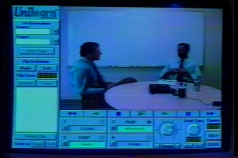 .
.
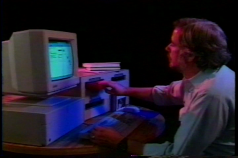 .(More
details: http://www.patents.com/us-5576844.html
Actually I go
back to the
days of ECM3
and Watkins
Johnson Co
from 1971, a
world of
physics and
microwave
antennas.
.(More
details: http://www.patents.com/us-5576844.html
Actually I go
back to the
days of ECM3
and Watkins
Johnson Co
from 1971, a
world of
physics and
microwave
antennas.
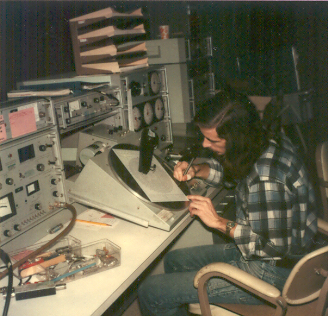
above: I am
working the
Anechoic
chamber test
station at WJ
1976ish.
Watkins-Jonson
Co. (
Palo
Alto and San
Jose, CA)
and Gaithersburg,
Maryland.
I have
built
thousands of
computers and
this is were I
am, mostly now
as a hobby and
for our
company and
friends... I
have no
commercial
interest in
computers...
we manufacture
AC power
products,
audio and
video related
electronics
and stereo
interconnects
and speakers.
Film
background,
still I love
the craft.
Also spent
much time as a
film fanatic
playing,
teaching and
doing old
school motion
picture
optical FX
while
attempting to
be an
associate
producer.
In a way
I think film
is a great way
to teach
because it
reaches out to
the
imaginations
of millions.
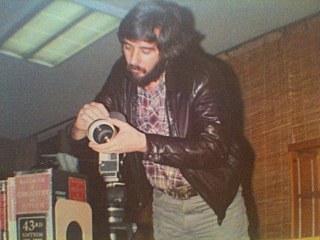 Picture
credit:
Todd
A Marks -
He is
a
Computer/Video
Playback
Supervisor.
He took
this picture a
very long time
ago and sent
it to me a few
years ago.
Picture
credit:
Todd
A Marks -
He is
a
Computer/Video
Playback
Supervisor.
He took
this picture a
very long time
ago and sent
it to me a few
years ago.
Above: Yours
truly in the
early 1980's,
I really miss
those days...
I would do it
differently if
I had the
choice of time
travel... but
it is always
true that
hindsight is
more 20-20.
If
curious, I do
have a
philosophical
page about
getting
pointed in a
direction,
were you try
and make a new
one or improve
the journey of
the one you
are on, in
life.


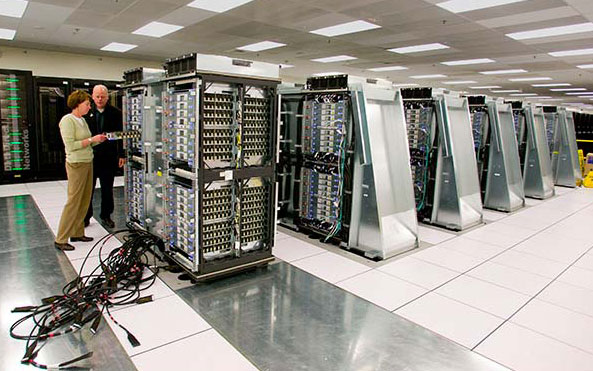 IBM
supercomputer
means a future
Linux Super
Computer.
IBM
supercomputer
means a future
Linux Super
Computer.
In this realm
it has no peer
or even faint
competition.
See this
graphic from
the BBC
{(select OS
type
(Operating
System)} and
every one of
the top 500
supercomputers
around the
world is
listed.
and almost all
will be
running Linux
or... in
decline now,
is its
predecessor
relative, UNIX
(takes a while
to load... http://www.bbc.co.uk/news/10187248
)
A good distro
of Linux
including its
applications
can easily go
over 200
million lines
of code.
Remember as a
desktop, it
has to do
everything you
can imagine.
Now about the
relevance of
Desktop
Computers...
The demise of
the PC desktop
at the entry
level of
computing...
is going
Mobile. And
that will be
the eventual
end of the
road for those
companies that
can't adapt...
Workstations
computers, the
New PC, for
those who need
and demand
more, will
become more
powerful or
offer
something
genuinely
innovative and
high end at
the
workstation
level.
It is not the
main focus of
the developers
of Linux nor
has it had
significant
market share.
Something
between 1.5
and 5 percent
depending on
which voodoo
you use to
calculate
something that
is not able to
be
calculated.
And in the
future, the PC
is likely to
go into
decline for
the average
person.
More of the
general
population are
using laptops
and mobile
devices today,
actually
having a fixed
location
Personal
Computer is as
a ratio of
those who have
a computing
device is
beginning to
decline...
barely
noticeable but
the trend is
there.
But Linux is
just starting
in a way.

This is
ideological in
nature... it
is. I had a
lot here
backing up
this
summation, but
what is the
point of lots
of "proof" in
a world not
willing to
listen.
So instead
of a waste of
bandwidth in
modern
parlance, I
have retained
the summation
and leave it
to you too see
or not.
As the
world closes
in on Freedom
and most
importantly
Liberty, as an
individual one
can fight
back... it
is done by
controlling
how you
interface with
the future.
Linux
is just one
powerful tool
to try and
maintain some
sense of self
determination
and personal
security... It
is not or
meant to be
the only way,
just one of
the ways.
At
least one has
some chance
with it, in
maintaining a
functional
aspect of
freedom in the
physical world
as it really
is.
It
requires
learning how
to build a
computer, or
understanding
how it is put
together, were
you do have
control of
what is on it,
and of how it
gets used.
With
Freedom comes
great
responsibility
and
vigilance...
and the price
is one of
being highly
educated,
being vigilant
and
maintaining
that. By
knowing what
and whom to
trust and what
and whom not
to trust.
Once trust
is lost, once
trust of the
people in its
government to
be trustworthy
or trust-able
with the
freedom and
independence
to be a free
people, then
it is time to
question
whether the
government
should be kept
as it is, or,
is it time to
think of a new
way to
rediscover and
enforce
freedom of the
people by the
people...
Living
in a
surveillance
society is not
the way, the
terrorists win
by that method
and You, The
Americans lose.
It is not
the concept of
a democratic
republic that
is the problem
but rather the
ideologies of
those in its
functional
management who
were entrusted
to manage it
that are to be
questioned and
if disloyal to
the
Constitution
and MOST
importantly
The "Bill of
Rights" in
fact... need
to be replaced
by those who
do believe in
the existence
of a
democratic
republic in
fact.... an oligarchy
in reality
was not the
idea of what
America was to
be...
Take warning:
President
Eisenhower's
Farewell
Address -
He was right,
very
much so.
the proof of
that is simply
the world as
it is now.
Heed the words
here: President
John F.
Kennedy
speaking to
that idea that
secrecy within
the government
is repugnant...
a
free and
powerful
independent
Press is
important in
warning the US
people on the
tyrannies of
its government
in practice.
"Good
night and good luck."

©2019 Michael
Crock  LLC.
LLC.
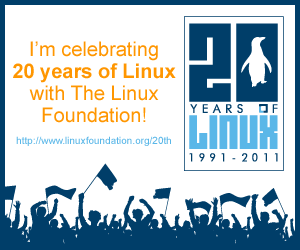 er... um 28 years now.
er... um 28 years now.






 .
. .
. .
Picture of Enya, ©Warner & co.
.
Picture of Enya, ©Warner & co. .
picture of ©Aurora Aksnes
.
picture of ©Aurora Aksnes .
.



 .
picture is about a year old.
.
picture is about a year old. .
. .
.
 .
Screenshots
here
.
Screenshots
here .
. .
.


 Above:BlueGriffon
ver 2.3.1
Above:BlueGriffon
ver 2.3.1 .
. .
.
 .
. .
. .
. .
.





 .
.
 .(More
details: http://www.patents.com/us-5576844.html
Actually I go
back to the
days of ECM3
and Watkins
Johnson Co
from 1971, a
world of
physics and
microwave
antennas.
.(More
details: http://www.patents.com/us-5576844.html
Actually I go
back to the
days of ECM3
and Watkins
Johnson Co
from 1971, a
world of
physics and
microwave
antennas.
 Picture
credit:
Todd
A Marks -
He is
a
Computer/Video
Playback
Supervisor.
He took
this picture a
very long time
ago and sent
it to me a few
years ago.
Picture
credit:
Todd
A Marks -
He is
a
Computer/Video
Playback
Supervisor.
He took
this picture a
very long time
ago and sent
it to me a few
years ago.

 IBM
supercomputer
means a future
Linux Super
Computer.
IBM
supercomputer
means a future
Linux Super
Computer.

 LLC.
LLC.
 er... um 28 years now.
er... um 28 years now.
